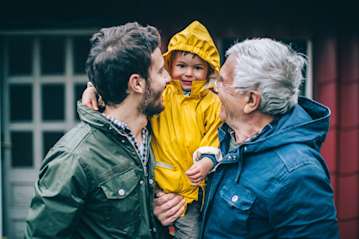When you need to explain to a child that someone has died, speak to them truthfully. Sometimes we try to protect children from upsetting situations, especially younger children, by using euphemisms to make it sound less upsetting. You may be worried about upsetting them but doing this can make things more confusing for them.
Avoid euphemisms when talking to children
Using euphemisms like, Grandma has ‘passed on’, ‘gone to sleep’ or ‘passed away’, can leave children with questions. Passed on to what? Will she wake up again soon? It’s not always clear to them what this means. One bereavement counsellor helped a young girl who was told her grandma had passed away. Weeks later she heard the girl had been told her sister had passed out at school and she immediately thought her sister had died. She just heard the word ‘passed’ and assumed the worst.
It’s okay to use the word ‘died’
Don’t be afraid to say that someone has died when talking to children. Child Bereavement UK agrees that honest, kind words are the right way to speak to them. This is an example from their website: “I have something very sad to tell you. Grandad has been very ill for some time and now he has died.”
All children deal with bereavement differently
Different children will react differently to the news that someone has died. Some may go quiet, have more questions, want to go play, or begin to cry. There is no right or wrong way for them to react and they will process the information in their own time, in their own way. Let them know that it’s okay to feel sad or mad, to go quiet for a little bit or to make jokes and be silly.
Talk about the person who has died
If it’s appropriate, talk about the person who died in front of children. Talk about happier times and memories and say the person’s name so they feel comfortable talking about them that way as well, when they want to. And if you need to cry, that’s okay too. Showing children that grownups feel sad is healthy and shows them it’s okay to cry and express themselves, too.
Amy and Tom books
In 2010, in partnership with Sudden (an initiative by the charity ‘Brake’) our Amy and Tom books were launched.
The Amy and Tom books are a tool for bereaved primary school aged children and are distributed free of charge to bereaved families, family liaison officers, schools, and medical professionals across the country.
Adults and children can read through the book together, helping the child to understand the unusual feelings they’re experiencing, and giving suggestions on how to cope.
Image copyright Brake 2021




